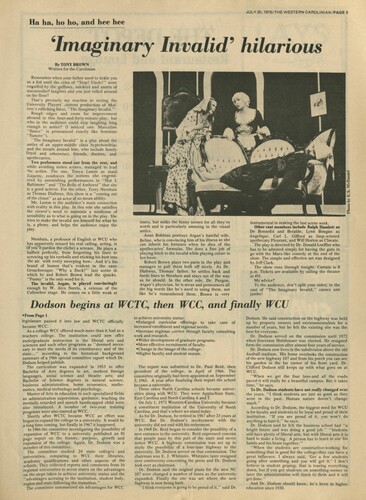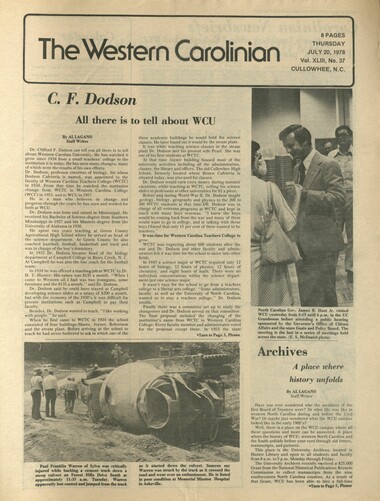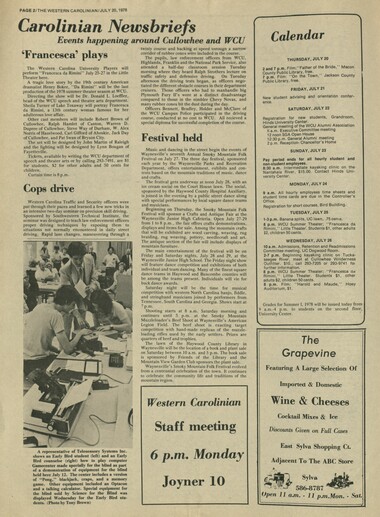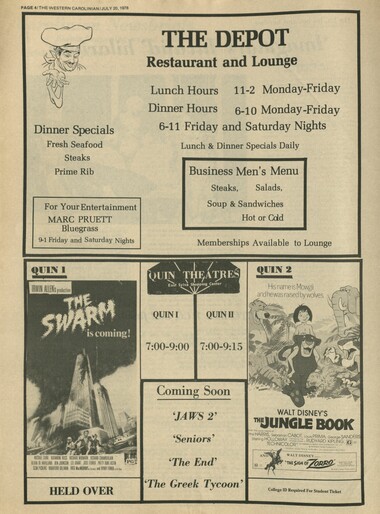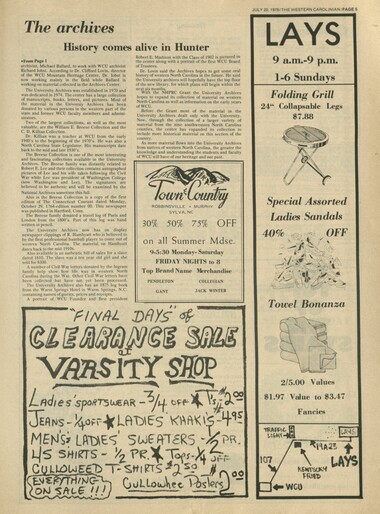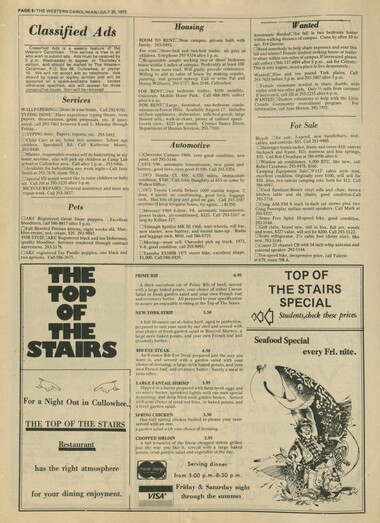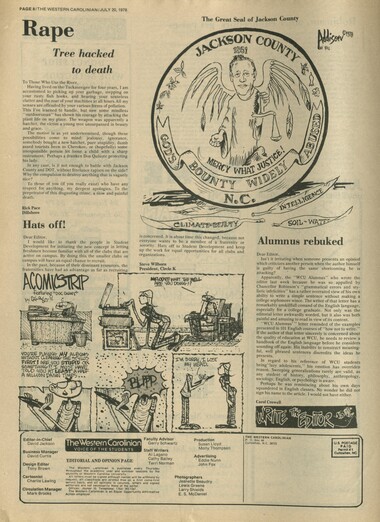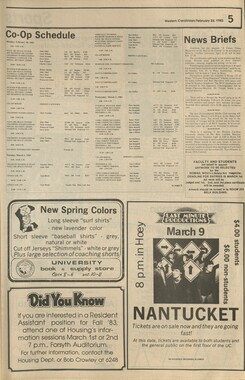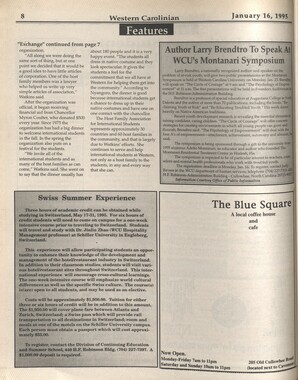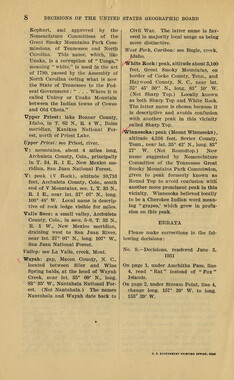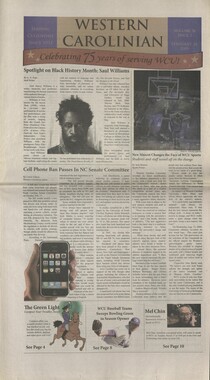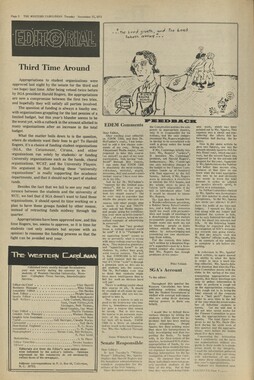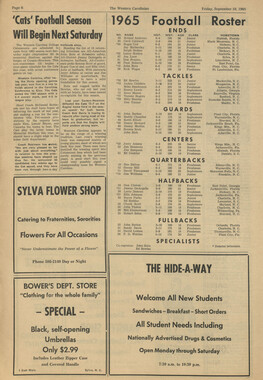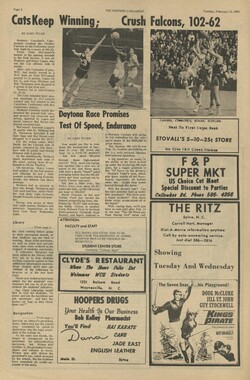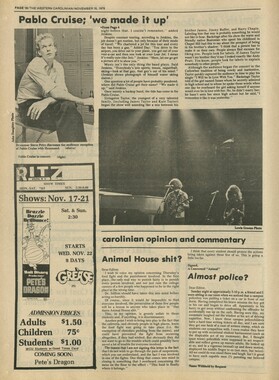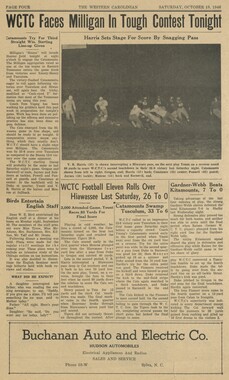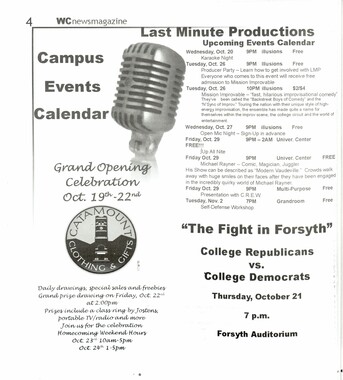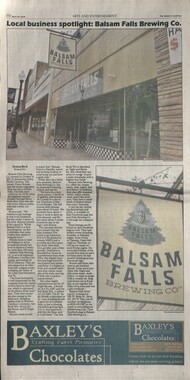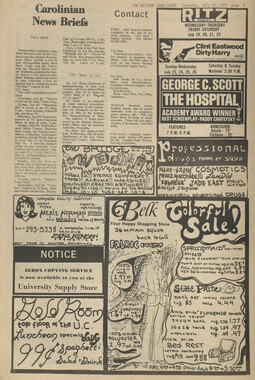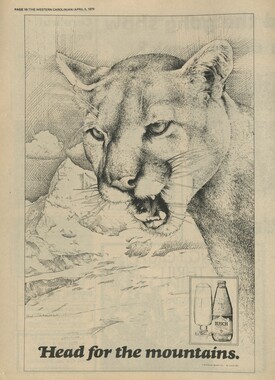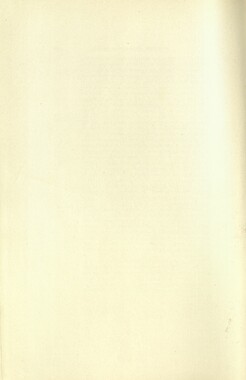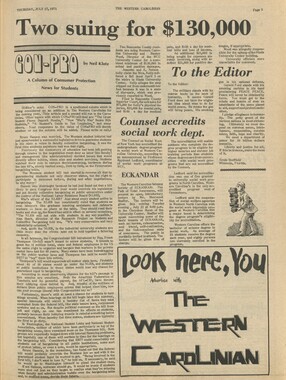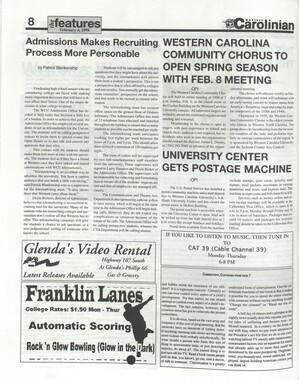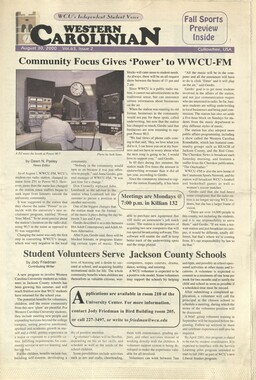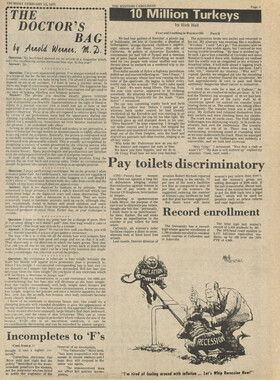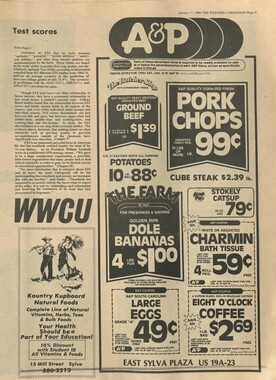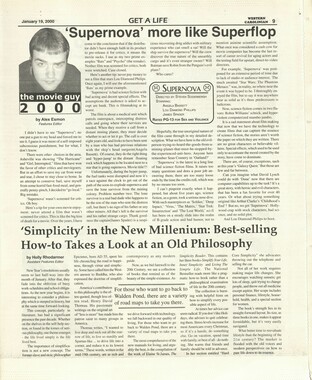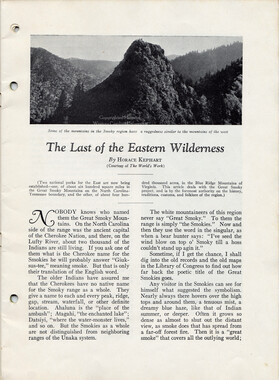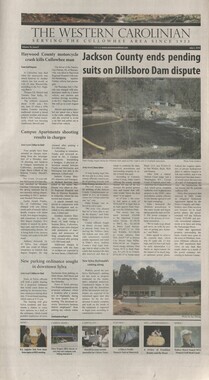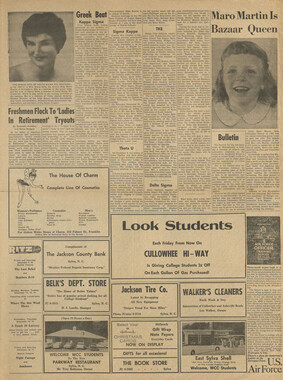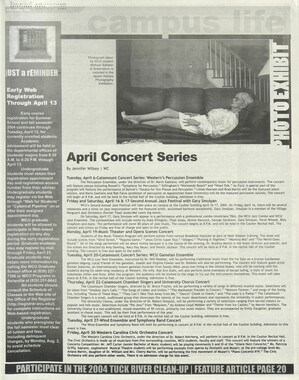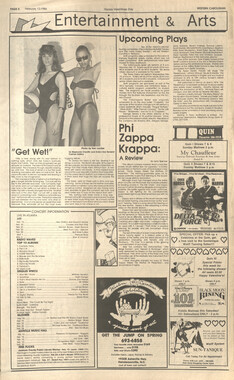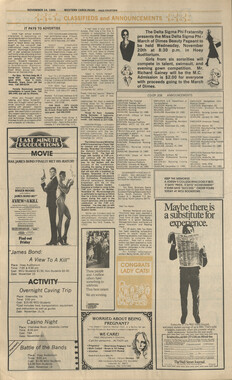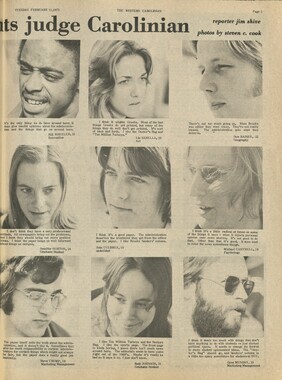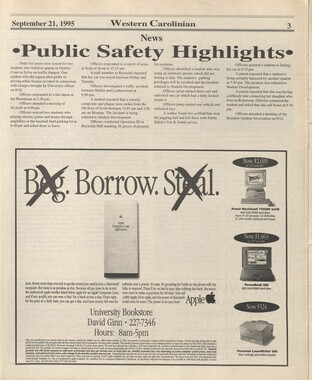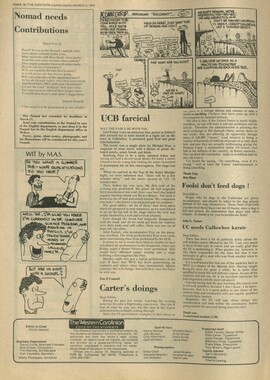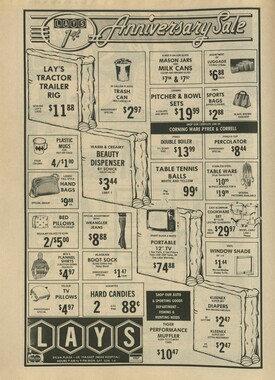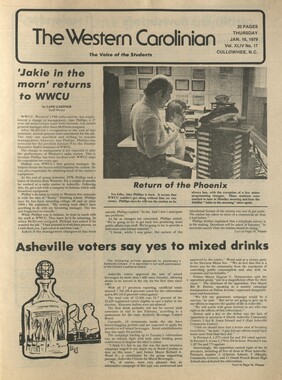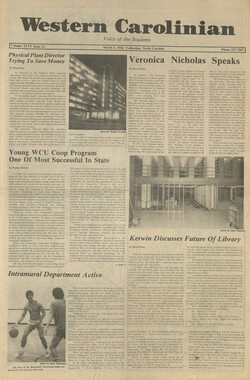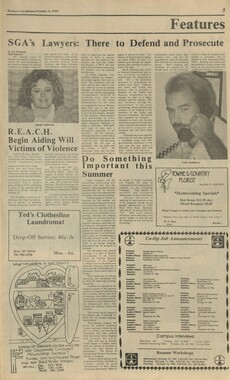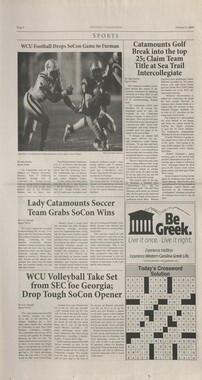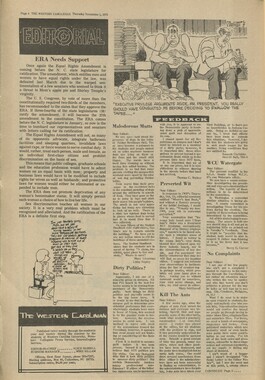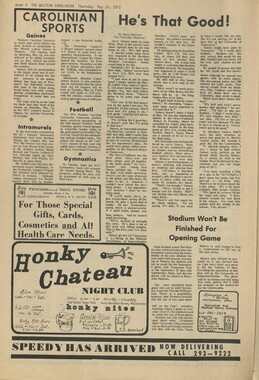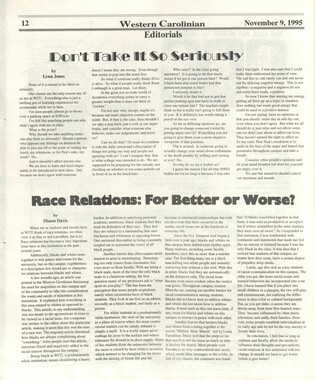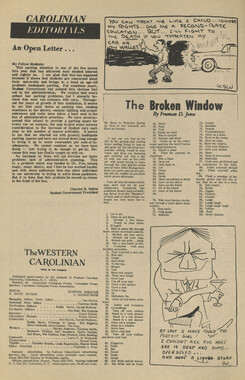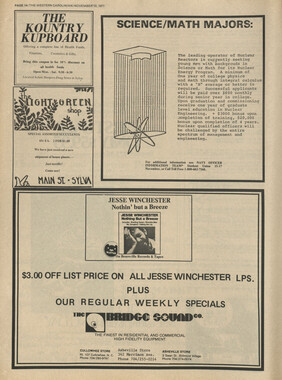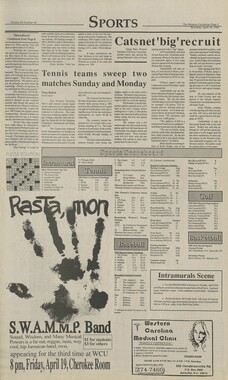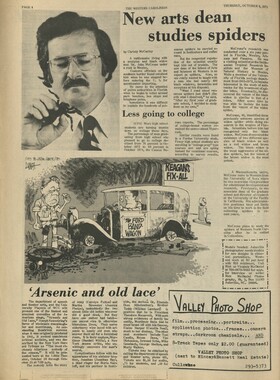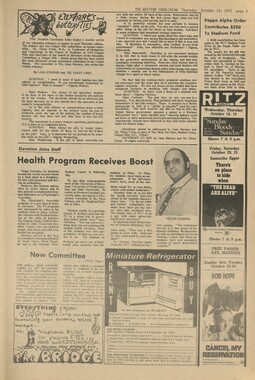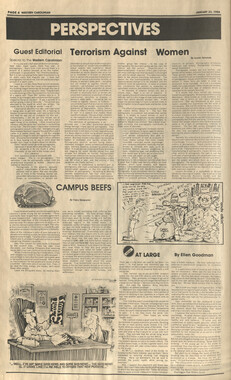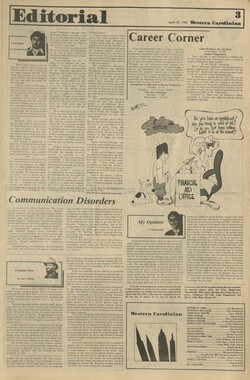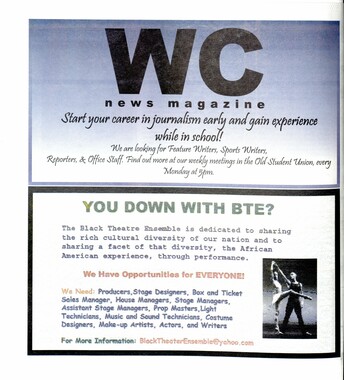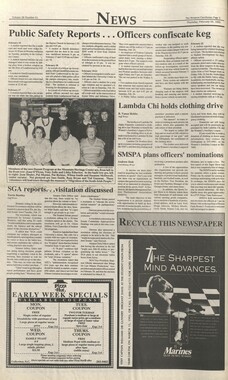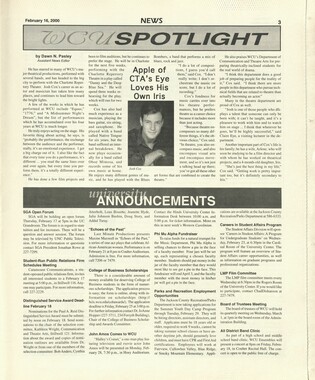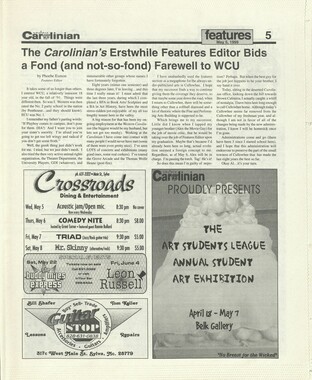Western Carolina University (20)
View all
- Canton Champion Fibre Company (2308)
- Cherokee Traditions (291)
- Civil War in Southern Appalachia (165)
- Craft Revival (1942)
- Great Smoky Mountains - A Park for America (2946)
- Highlights from Western Carolina University (430)
- Horace Kephart (941)
- Journeys Through Jackson (159)
- LGBTQIA+ Archive of Jackson County (85)
- Oral Histories of Western North Carolina (314)
- Picturing Appalachia (6873)
- Stories of Mountain Folk (413)
- Travel Western North Carolina (160)
- Western Carolina University Fine Art Museum Vitreograph Collection (129)
- Western Carolina University Herbarium (92)
- Western Carolina University: Making Memories (738)
- Western Carolina University Publications (2488)
- Western Carolina University Restricted Electronic Theses and Dissertations (146)
- Western North Carolina Regional Maps (71)
- World War II in Southern Appalachia (131)
University of North Carolina Asheville (6)
View all
- Allanstand Cottage Industries (62)
- Appalachian National Park Association (53)
- Bennett, Kelly, 1890-1974 (1463)
- Berry, Walter (76)
- Brasstown Carvers (40)
- Carver, George Washington, 1864?-1943 (26)
- Cathey, Joseph, 1803-1874 (1)
- Champion Fibre Company (233)
- Champion Paper and Fibre Company (297)
- Cherokee Indian Fair Association (16)
- Cherokee Language Program (22)
- Crowe, Amanda (40)
- Edmonston, Thomas Benton, 1842-1907 (7)
- Ensley, A. L. (Abraham Lincoln), 1865-1948 (275)
- Fromer, Irving Rhodes, 1913-1994 (70)
- George Butz (BFS 1907) (46)
- Goodrich, Frances Louisa (120)
- Grant, George Alexander, 1891-1964 (96)
- Heard, Marian Gladys (60)
- Kephart, Calvin, 1883-1969 (15)
- Kephart, Horace, 1862-1931 (313)
- Kephart, Laura, 1862-1954 (39)
- Laney, Gideon Thomas, 1889-1976 (439)
- Masa, George, 1881-1933 (61)
- McElhinney, William Julian, 1896-1953 (44)
- Niggli, Josephina, 1910-1983 (10)
- North Carolina Park Commission (105)
- Osborne, Kezia Stradley (9)
- Owens, Samuel Robert, 1918-1995 (11)
- Penland Weavers and Potters (36)
- Roberts, Vivienne (15)
- Roth, Albert, 1890-1974 (142)
- Schenck, Carl Alwin, 1868-1955 (1)
- Sherrill's Photography Studio (2565)
- Southern Highland Handicraft Guild (127)
- Southern Highlanders, Inc. (71)
- Stalcup, Jesse Bryson (46)
- Stearns, I. K. (213)
- Thompson, James Edward, 1880-1976 (226)
- United States. Indian Arts and Crafts Board (130)
- USFS (683)
- Vance, Zebulon Baird, 1830-1894 (1)
- Weaver, Zebulon, 1872-1948 (58)
- Western Carolina College (230)
- Western Carolina Teachers College (282)
- Western Carolina University (2005)
- Western Carolina University. Mountain Heritage Center (18)
- Whitman, Walt, 1819-1892 (10)
- Wilburn, Hiram Coleman, 1880-1967 (73)
- Williams, Isadora (3)
- Cain, Doreyl Ammons (0)
- Crittenden, Lorraine (0)
- Rhodes, Judy (0)
- Smith, Edward Clark (0)
- Appalachian Region, Southern (2569)
- Asheville (N.C.) (1923)
- Avery County (N.C.) (26)
- Blount County (Tenn.) (195)
- Buncombe County (N.C.) (1672)
- Cherokee County (N.C.) (283)
- Clay County (N.C.) (555)
- Graham County (N.C.) (236)
- Great Smoky Mountains National Park (N.C. and Tenn.) (519)
- Haywood County (N.C.) (3569)
- Henderson County (N.C.) (70)
- Jackson County (N.C.) (4909)
- Knox County (Tenn.) (35)
- Knoxville (Tenn.) (13)
- Lake Santeetlah (N.C.) (10)
- Macon County (N.C.) (420)
- Madison County (N.C.) (215)
- McDowell County (N.C.) (39)
- Mitchell County (N.C.) (132)
- Polk County (N.C.) (35)
- Qualla Boundary (982)
- Rutherford County (N.C.) (76)
- Swain County (N.C.) (2182)
- Transylvania County (N.C.) (270)
- Watauga County (N.C.) (12)
- Waynesville (N.C.) (86)
- Yancey County (N.C.) (72)
- Aerial Photographs (3)
- Aerial Views (60)
- Albums (books) (4)
- Articles (1)
- Artifacts (object Genre) (228)
- Bibliographies (1)
- Biography (general Genre) (2)
- Cards (information Artifacts) (38)
- Clippings (information Artifacts) (191)
- Copybooks (instructional Materials) (3)
- Crafts (art Genres) (622)
- Depictions (visual Works) (21)
- Design Drawings (1)
- Drawings (visual Works) (185)
- Envelopes (73)
- Exhibitions (events) (1)
- Facsimiles (reproductions) (1)
- Fiction (general Genre) (4)
- Financial Records (12)
- Fliers (printed Matter) (67)
- Glass Plate Negatives (381)
- Guidebooks (2)
- Internegatives (10)
- Interviews (815)
- Land Surveys (102)
- Letters (correspondence) (1013)
- Manuscripts (documents) (618)
- Maps (documents) (177)
- Memorandums (25)
- Minutes (administrative Records) (59)
- Negatives (photographs) (6090)
- Newsletters (1290)
- Newspapers (2)
- Notebooks (8)
- Occupation Currency (1)
- Paintings (visual Works) (1)
- Pen And Ink Drawings (1)
- Periodicals (193)
- Personal Narratives (10)
- Photographs (12976)
- Plans (maps) (1)
- Poetry (5)
- Portraits (4568)
- Postcards (329)
- Programs (documents) (181)
- Publications (documents) (2440)
- Questionnaires (65)
- Relief Prints (26)
- Sayings (literary Genre) (1)
- Scrapbooks (282)
- Sheet Music (2)
- Slides (photographs) (402)
- Songs (musical Compositions) (2)
- Sound Recordings (796)
- Specimens (92)
- Speeches (documents) (18)
- Tintypes (photographs) (8)
- Transcripts (322)
- Video Recordings (physical Artifacts) (23)
- Text Messages (0)
- A.L. Ensley Collection (275)
- Appalachian Industrial School Records (7)
- Appalachian National Park Association Records (336)
- Axley-Meroney Collection (2)
- Bayard Wootten Photograph Collection (20)
- Bethel Rural Community Organization Collection (7)
- Blumer Collection (5)
- C.W. Slagle Collection (20)
- Canton Area Historical Museum (2110)
- Carlos C. Campbell Collection (462)
- Cataloochee History Project (64)
- Cherokee Studies Collection (4)
- Daisy Dame Photograph Album (5)
- Daniel Boone VI Collection (1)
- Doris Ulmann Photograph Collection (112)
- Elizabeth H. Lasley Collection (1)
- Elizabeth Woolworth Szold Fleharty Collection (4)
- Frank Fry Collection (95)
- George Masa Collection (173)
- Gideon Laney Collection (452)
- Hazel Scarborough Collection (2)
- Hiram C. Wilburn Papers (28)
- Historic Photographs Collection (236)
- Horace Kephart Collection (861)
- Humbard Collection (33)
- Hunter and Weaver Families Collection (1)
- I. D. Blumenthal Collection (4)
- Isadora Williams Collection (4)
- Jesse Bryson Stalcup Collection (47)
- Jim Thompson Collection (224)
- John B. Battle Collection (7)
- John C. Campbell Folk School Records (80)
- John Parris Collection (6)
- Judaculla Rock project (2)
- Kelly Bennett Collection (1482)
- Love Family Papers (11)
- Major Wiley Parris Civil War Letters (3)
- Map Collection (12)
- McFee-Misemer Civil War Letters (34)
- Mountain Heritage Center Collection (4)
- Norburn - Robertson - Thomson Families Collection (44)
- Pauline Hood Collection (7)
- Pre-Guild Collection (2)
- Qualla Arts and Crafts Mutual Collection (12)
- R.A. Romanes Collection (681)
- Rosser H. Taylor Collection (1)
- Samuel Robert Owens Collection (94)
- Sara Madison Collection (144)
- Sherrill Studio Photo Collection (2558)
- Smoky Mountains Hiking Club Collection (616)
- Stories of Mountain Folk - Radio Programs (374)
- The Reporter, Western Carolina University (510)
- Venoy and Elizabeth Reed Collection (16)
- WCU Gender and Sexuality Oral History Project (32)
- WCU Mountain Heritage Center Oral Histories (25)
- WCU Oral History Collection - Mountain People, Mountain Lives (71)
- WCU Students Newspapers Collection (1920)
- Western North Carolina Tomorrow Black Oral History Project (69)
- William Williams Stringfield Collection (2)
- Zebulon Weaver Collection (109)
- African Americans (390)
- Appalachian Trail (35)
- Artisans (521)
- Cherokee art (84)
- Cherokee artists -- North Carolina (10)
- Cherokee language (21)
- Cherokee pottery (101)
- Cherokee women (208)
- Church buildings (189)
- Civilian Conservation Corps (U.S.) (111)
- College student newspapers and periodicals (2009)
- Dams (107)
- Dance (1023)
- Education (222)
- Floods (61)
- Folk music (1015)
- Forced removal, 1813-1903 (2)
- Forest conservation (220)
- Forests and forestry (1184)
- Gender nonconformity (4)
- Great Smoky Mountains National Park (N.C. and Tenn.) (181)
- Hunting (45)
- Landscape photography (25)
- Logging (119)
- Maps (83)
- Mines and mineral resources (8)
- North Carolina -- Maps (18)
- Paper industry (38)
- Postcards (255)
- Pottery (135)
- Railroad trains (72)
- Rural electrification -- North Carolina, Western (3)
- School integration -- Southern States (2)
- Segregation -- North Carolina, Western (5)
- Slavery (5)
- Sports (452)
- Storytelling (243)
- Waterfalls -- Great Smoky Mountains (N.C. and Tenn.) (66)
- Weaving -- Appalachian Region, Southern (280)
- Wood-carving -- Appalachian Region, Southern (328)
- World War, 1939-1945 (173)
Western Carolinian Volume 43 Number 37
Item
Item’s are ‘child’ level descriptions to ‘parent’ objects, (e.g. one page of a whole book).
-
-
JULY 20, 1978/THE WESTERN CAROLINIAN/PAGE 3 Ha ha, ho ho, and hee hee 'Imaginary Invalid9 hilarious By TONY BROWN Written for the Carolinian Remember when your father used to tickle you as a kid until the cries of "Slop! Uncle!" were engulfed by the guffaws, snickers and snorts of uncontrolled laughter and vou just rolled around on the floor? That's precisely my reaction to seeing the University Players' current production of Moliere's rollicking farce. "The Imaginary Invalid." Rough edges and room for improvement abound in this hour-and-forty-minute-play, but who in the audience could stop laughing long enough to notice? (I noticed one. Masculine "fiance" is pronounced exactly like feminine "fiancee-"). "The Imaginary Invalid" is a play about the antics of an upper-middle class hyprchondriac and the people around him, who include family (loyal and otherwise), friends, doctors, and apothecaries. Two performers stood out from the rest, and while avoiding stolen scenes, managed to lead *he action. The one, Tonya Lamm as maid [binette, reinforces the notions she engendered by astonishing performances in "Hot L Baltimore" and "The Belle of Amherst" that she is a good actress. For the other, Terry Nienhuis as Thomas Diaforus, this show is a "coming out of the closet" as an actor of no mean ability. Ms. Lamm is the audience's main connection with reality in this play. In this role she satisfies the viewer's need to maintain a modicum of sensibility as to what is going on in the play. She tries to make the invalid see himself for what he is, a phony, and helps the audience enjoy the play. Nienhuis, a professor of English at WCU who has apparently missed his real calling, acting, is (if you'll pardon the cliche) a scream. He plays a halfwit perfectly, from forgetting his lines to screwing up his eyeballs and sticking his butt into the air with every sweeping bow. And it's his brand of humor that's evident in the zany Grouchoesque "Why a Duck?" last scene in which he and Robert Brown lead the quacks. "Funny" is the only word for it. The Invalid, Argan, is played convincingly enough by W. Alex Norris, a veteran of the Cullowhee stage. He comes on a little weak at times, but milks the funny scenes for all they're worth and is particularly amusing in the visual antics. Anne Robbins portrays Argan's hateful wife, Beline, who is convincing him of his illness so she can inherit his fortunes when he dies of the apothecaries' formulas. She does a fine job of playing bitch to the invalid while playing cutsie to her lover. Robert Brown plays two parts in the play and manages to pull them both off nicely. As Dr. Diaforus, Thomas' father, he settles back and feeds lines to Nienhuis and stays out of the way as he should. In the other role. Dr. Purgon, Argan's physician, he is mean and pronounces all the big words like he's used to using them, not like he's remembered them. . Brown is very instrumental in making the last scene work. Other cast members include Ralph Hamlett as De Bonnefoi and Beralde, Lynn Bougan as Angelique, Carl L. Gifford as limp-wristed apothecary Fleurant, and Will Horton as Clneate. The play is directed by Dr. Donald Loeffler who has to be admired simply for having the guts to go with the Marx-like comedy at the end of the show. The simple and effective set was designed by Jeff Clark. . The show runs through tonight. Curtain is 8 p.m. Tickets are available by calling the theater at49l. My advice? To the audience, don't split your sides; to the cast of "The Imaginary Invalid," cassez une jambe! Dodson begins at WCTC, then WCC, and finally WCU •From Page 1 legislature passed it into law and WCTC officially became WCC. As a college WCC offered much more than it had as a teachers college. The institution could now offer undergraduate instruction in the liberal arts and sciences and such other programs as "deemed necessary to meet the needs of its constituency and of the state..." according to the historical background summary of a 1966 special committee report which Dr. Dodson helped publish. The curriculum was expanded in 1953 to offer Bachelor of Arts degrees in art, modern foreign languages, social science and theatre arts; and Bachelor of Science degrees in natural science, business administration, home economics, mathematics, medical technology and psychology. Master of Arts in education in such specialized fields as .administration supervision, guidance, teaching the mentally retarded and speech handicapped child were also introduced. A number of two-year training programs were also started at WCC. Shortly after WCTC became WCC an effort was begun to expand the college to a university. It would be a long time coming, but finally in 1967 it happened. In 1966 the committee investigating the possibility of expansion of WCC to a university published an 81 page report on the history, purpose, growth and expansion of the college. Again, Dr. Dodson was a member of this committee. The committee studied 24 state colleges and universities, comparing to WCC their libraries, academic qualifications and other aspects of the schools. They collected reports and comments from 16 regional universities in seven states on the advantages on the steps taken to achieve university status and the "advantages accruing to the institution, student body, region and state following the transition." The committee summarized six advantages for WCC to achieve university status: •Enlarged curricular offerings to take care of increased enrollment and regional needs. •Increase regional service through faculty consulting work and research. •Wider development of graduate programs. •More effective recruitment of faculty. •Change in the image of the college. •Higher faculty and student morale. The report was submitted to Dr. Paul Reid, then president of the college, in April of 1966. The committee originally had been appointed on September 3, 1965. A year after finalizing their report the school became a university. Three other North Carolina schools became universities along with WCU. They were Applachian State, East Carolina and North Carolina A and T. On July 1, 1972 Western Carolina University became ■ a constituent institution of the University of North Carolina, and that's where we stand today. As for Dr. Dodson, he retired in 1967 after 33 years at WCU. But Dr. Dodson's involvement with the university did not end with his retirement. In 1968 Dr. Reid began to consider the possiblity of a new entrance to the university- Reid expressed concern that people pass by this part of the state and never notice WCU. A highway commission was set up to study the possibility of a four-lane highway to the university. Dr. Dodson served on that commission. The chairman was E. J. Whitmire. Whitmire later resigned over controversy concerning the press and Dr. Dodson took over as chairman. Dr. Dodson said the original plans for the new NC 107 were changed a number of times as the university expanded. Finally the site was set where the new- highway is now being built. "I think everyone is going to be proud of it." said Dr. Dodson. He said construction on the highway was held up by property owners and environmentalists for a number of years, but he felt the existing site was the best for everyone. Dr. Dodson served on the commission until 1972 when Governor Holshouser was elected. He resigned form the commission after almost four years of service. Dr. Dodson now lives in the subdivision above the old football stadium. His home overlooks the construction of the new highway 107 and from his porch you can see his garden in the far corner of his front yard. Dr. Clifford Dodson still keeps up with what goes on at WCU. "When we get the four lane-and all the roads paved-it will really be a beautiful campus. But it takes time." he says. To Dr. Dodson students have not really changed over the years. "I think students are just as good as they were in the past. Human nature doesn't change much." According to Dr. Dodson, the biggest need for WCU is for faculty and students to be loyal and proud of their institution. "If you are proud of it, you won't do anything to hurt it," he says. Dr. Dodson said he felt the business school had "a bright future and was doing a good job." "Students still have plenty of liberal arts, but with liberal arts it is hard to make a living. A person has to learn to use his hands and his brain together." "When the students are constructive-working for something that is good for the college-they can have a great influence. I always said, 'Get a few students going after something and you will get it.' I don't believe in student griping, that is tearing everything down, but if you get students on something-sooncr or later the administration will listen to them and it will get done." And Dr. Dodson should know, he's been in higher education since 1930.
Object
Object’s are ‘parent’ level descriptions to ‘children’ items, (e.g. a book with pages).
-
The Western Carolinian is Western Carolina University’s student-run newspaper. The paper was published as the Cullowhee Yodel from 1924 to 1931 before changing its name to The Western Carolinian in 1933.
-

